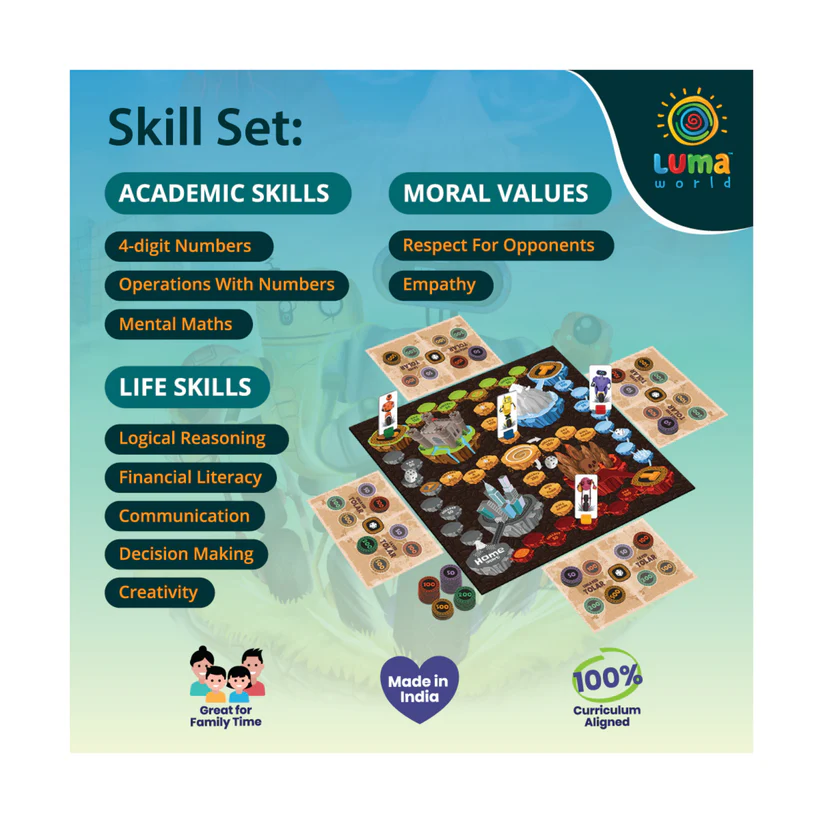4 Simple Tips to Overcome Brain Fog and Mental Fatigue
Zeba ParkarShare
Feeling mentally drained and struggling to focus on everyday tasks? You’re definitely not alone in this. Many people experience brain fog and mental fatigue at various points in their lives, and the effects can be overwhelming. These cognitive challenges not only impact your ability to perform day-to-day tasks but can also influence your mood, productivity, and even physical health. If not addressed, they may influence your overall way of life, resulting in frustration and a loss of motivation.
The good news is that these conditions are not permanent, and there are good methods to overcome them. Brain fog and mental fatigue can be caused by a variety of reasons like stress, lack of sleep, or even an excessive workload. By adopting the right strategy, you can regain mental clarity and energy without allowing these hurdles to dominate your life.
In this post, we're going to present 4 simple but effective strategies that can guide you through combating brain fog and mental lethargy. These tips have been tested and found to advance your mental powers, ensure healthy minds, and equip you to deal with pressure successfully. Whether it's having better sleep quality or performing stimulating activities, there are steps in place to bring you renewed, ready-to-once-again-take-life-by-storm vitality.
First let's understand What exactly is brain fog and mental fatigue, and how do they impact our daily lives?
Understanding Brain Fog and Mental Fatigue
Before jumping into the tips, it’s essential to understand what brain fog and mental fatigue are. Both are common conditions that affect many people at different stages of their lives.
What is Brain Fog?
Brain fog is a state of mental confusion that makes it difficult to focus, think clearly, and process information. It often feels like your brain is in a haze, leading to memory problems, trouble concentrating, and difficulty making decisions.
For example, you might find yourself staring at a document for several minutes without being able to focus on what’s in front of you, or forget why you walked into a room. Brain fog can be triggered by various factors such as stress, poor diet, lack of sleep, or underlying health conditions.
What Causes Mental Fatigue?
Mental fatigue is a feeling of being mentally drained, even if you've had adequate rest. It typically occurs due to chronic stress, prolonged periods of cognitive strain, or emotional exhaustion.
For instance, after a long day of meetings, you might feel like you can’t think straight, even though physically you aren’t tired. If you're constantly battling mental fatigue, it can affect your daily life, making simple tasks, like responding to emails or completing work assignments, feel exhausting and overwhelming.
Let's get into 4 tips and see how you can finally break through brain fog and mental fatigue.
1. Prioritize Sleep for Mental Clarity
One of the most significant contributors to brain fog and mental fatigue is poor sleep. Sleep is the foundation of good mental health and plays a crucial role in maintaining optimal cognitive function.
When you don’t get enough quality sleep, your brain struggles to process information effectively, leading to forgetfulness, difficulty concentrating, and an overall lack of motivation. If you’ve been battling brain fog, it’s essential to look at your sleep habits as a key factor in your mental clarity.
The Importance of Healthy Sleep Habits
It’s not just about how many hours you sleep, but more importantly, the quality of that sleep. Poor sleep habits can directly contribute to mental fatigue and worsened cognitive symptoms. Things like irregular sleep schedules, excessive screen time before bed, or consuming caffeine late in the day can interfere with your ability to get the restful sleep your brain needs. These disruptions may leave you feeling groggy the next day, affecting your brain function and making it harder to focus on daily tasks.
Additionally, sleep deprivation can lead to an imbalance in your nervous system, increasing stress and contributing to mental strain. The longer you neglect your sleep needs, the harder it becomes to break the cycle of brain fog. It’s crucial to take a step back and reevaluate your sleep habits to improve both your mental health and overall well-being.
Tips for Improving Sleep Quality
If you’re struggling with mental fatigue, here are some practical tips to enhance your sleep quality and improve your mental clarity:
1. Stick to a Consistent Sleep Schedule:
Your body thrives on routine, so go to bed and wake up at the same time each day. This helps regulate your body’s internal clock, making it easier to fall asleep and wake up refreshed.
2. Create a Relaxing Bedtime Routine:
Incorporating calming activities before bed, such as deep breathing exercises, reading, or meditation, can help signal to your body that it’s time to wind down. This can improve the quality of your sleep and reduce mental fatigue.
3. Limit Caffeine and Screen Time:
Caffeine and screen exposure late in the day can interfere with your ability to fall asleep. Try to avoid consuming caffeine or engaging with screens at least an hour before bedtime to allow your body to naturally wind down.
4. Invest in a Comfortable Sleep Environment:
Ensure your bedroom is conducive to rest. A quiet, dark, and cool room can significantly enhance the quality of your sleep, helping you wake up feeling energized and ready to take on the day.
By improving your sleep habits, you’ll notice a reduction in brain fog, a boost in cognitive function, and increased energy levels throughout the day. Prioritizing sleep is one of the most effective ways to regain mental clarity and improve your overall health.
2. Manage Stress to Prevent Mental Strain
One of the main reasons for brain fog and mental fatigue is chronic stress. When you are constantly under stress or overwhelmed, your thinking ability and decision-making capacity get seriously impaired. Gradually, stress also contributes to physical problems like poor sleep, digestive disorders, and general health issues that also add to mental fatigue. Proper management of stress is important in order to end brain fog and regain your mental sharpness.
Stress and Its Impact on Cognitive Function
When you're under prolonged stress, your body releases cortisol. In short bursts, cortisol is helpful—it's the hormone that triggers the "fight or flight" response. But when you're stressed all the time, cortisol levels stay high, which is bad news for your cognitive abilities.
High cortisol levels can negatively impact memory, decrease focus, and influence mental well-being. These mental problems then lead to a vicious cycle where the stress leads to mental exhaustion, and the brain fog makes it more difficult to deal with stress optimally.
Chronic stress not only affects your mindset; it also affects many bodily functions. It can cause insomnia, indigestion, and even lead to other ailments such as high blood pressure or obesity. This is all the more reason to break the vicious cycle of mental exhaustion and brain fogginess.
Effective Stress Management Techniques
Managing stress is essential for maintaining a clear, sharp mind. Incorporating stress-reducing techniques into your daily routine can help lower cortisol levels, reduce mental strain, and improve overall mental clarity.
Here are some effective strategies:
1. Practice Deep Breathing Exercises:
Taking a few moments each day to breathe deeply can significantly calm your nervous system. Deep breathing lowers cortisol levels and helps relieve tension, reducing mental fatigue.
2. Engage in Mindfulness or Meditation:
These mindfulness practices help you stay present and focused, reducing feelings of anxiety. Regular meditation allows your mind to take a break from daily stressors and provides mental clarity.
3. Take Regular Breaks:
Whether you're working or engaging in other tasks, taking short breaks throughout the day is essential. These breaks recharge your brain, improve focus, and prevent burnout, helping to combat brain fog.
By incorporating these simple stress management techniques into your routine, you can significantly reduce mental fatigue, enhance cognitive function, and restore mental clarity, making it easier to tackle daily tasks with a refreshed mind.
3. Keep Your Mind Active with Brain Games
When fighting against brain fog and mental exhaustion, staying mentally stimulated with stimulating brain games can make a big impact. Mental challenges such as memory problems, being unfocused, and mental exhaustion don't need to control your life. Board games are more than entertaining—board games also help enhance mental clarity and stimulate cognitive function. In this section, we'll discuss how games can revitalize your mind and minimize the mental fatigue you're experiencing.
Why Brain Games Are Effective for Mental Clarity
Mental fog can cloud your focus, making it hard to concentrate or retain information. Luckily, playing brain games is a powerful strategy to combat this. When you play games that require strategic thinking, problem-solving, and concentration, you're stimulating your brain and improving its ability to process information. These types of games challenge your cognitive skills, helping to boost memory, enhance focus, and develop critical thinking abilities—all while having fun.
Board games are particularly effective because they engage both your mind and body, providing a break from screen time and promoting deeper focus. Games that involve numbers, strategy, or problem-solving can be incredibly helpful in overcoming mental fatigue, giving your brain the exercise it needs to stay sharp.
Examples of Brain-Boosting Board Games:
1. Terra Loop: An Adventure Board Game - Age 7+
Terra Loop involves players mastering number operations and money concepts while collecting ancient currency. The game promotes mental math, logical reasoning, and decision-making—all essential cognitive functions that combat mental fatigue.

By engaging in these tasks, players stimulate their brains, improve concentration, and enhance memory. Additionally, the game’s interactive nature and fun, educational theme make it easier to stay engaged, helping your mind stay active and focused.

2. Alpha Steel: A Tactical Board Game - Age 10+
Alpha Steel is a strategy game that challenges players to use resource management, problem-solving, and tactical thinking. These activities require mental agility, helping to sharpen focus and improve cognitive abilities.

The game’s emphasis on decision-making and logical reasoning encourages the brain to stay sharp, making it a great tool for fighting mental exhaustion. Furthermore, the game helps with understanding concepts like profit, loss, and percentages, which can enhance mathematical and financial literacy, further stimulating the brain.

You can explore ToadBird’s exciting collection of board games and boost your brain power while having fun!
4. Improve Your Diet for Better Brain Function
What you eat has a profound impact on your cognitive function and overall mental health. A poor diet can contribute to mental fatigue and brain fog, while a balanced, nutrient-rich diet can enhance memory, concentration, and overall brain health.
The Link Between Diet and Cognitive Function
Your brain requires specific nutrients to function optimally. Deficiencies in essential nutrients like omega-3 fatty acids, B vitamins, and antioxidants can impair brain function, leading to mental fatigue, poor focus, and cognitive decline. Ensuring that your diet supports brain health is a simple yet powerful way to improve your mental clarity and overall well-being.
Foods That Boost Brain Health:
1. Omega-3 Fatty Acids
Omega-3s are crucial for brain function and memory. They can be found in fatty fish like salmon, as well as in plant-based sources such as walnuts and flaxseeds. These healthy fats promote brain cell structure, improve communication between brain cells, and help reduce inflammation, which is key in maintaining cognitive health.
2. Leafy Greens
Vegetables like spinach and kale are packed with vitamins, minerals, and antioxidants that support cognitive function. They are particularly rich in vitamin K, which plays a role in brain cell health, and other nutrients that protect against oxidative stress and inflammation, two major contributors to cognitive decline.
3. Berries
Berries, such as blueberries and strawberries, are loaded with antioxidants that help protect the brain from oxidative stress. These antioxidants also improve memory and support overall brain health, making berries a powerful addition to any diet for combating brain fog.
4. Nuts and Seeds
A great source of healthy fats, nuts and seeds—such as almonds, walnuts, and chia seeds—help reduce inflammation and promote healthy brain function. They also support long-term cognitive health, making them an essential part of a brain-boosting diet.
Conclusion: Regain Your Mental Clarity
Overcoming brain fog and mental fatigue is achievable with the right strategies and consistent effort. Start by prioritizing sleep, creating healthy sleep habits, and managing your stress levels. Regular physical activity, stress management, and brain games like board games can also play a significant role in enhancing your cognitive function and mental clarity.
Remember, your brain is an incredibly powerful tool, and taking care of it with simple lifestyle changes can make a world of difference. By incorporating these 4 simple tips into your daily life, you’ll reduce mental fatigue, enhance brain function, and start experiencing clearer thinking and more energy throughout the day.
Take it one step at a time, and watch as you regain your mental sharpness and overcome the challenges of brain fog and mental fatigue. You’ve got this!